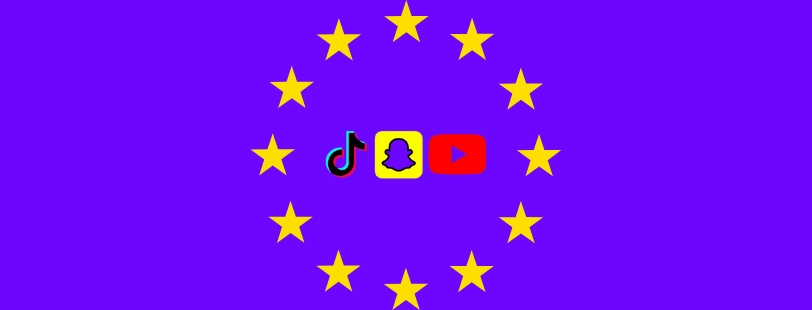
EU Probes YouTube, Snapchat & TikTok on Algorithm Transparency
In a world where algorithms dictate much of our online experiences, Europe is taking a stand. Recently, the European Commission has initiated a significant inquiry into three major players: YouTube, Snapchat, and TikTok. This move emphasizes the importance of algorithm transparency, especially in the digital age where content regulation is crucial for the safety and welfare of users. So, what’s behind this inquiry, and why should we care? Algorithm Transparency in Social Media
Let’s dive deeper into this evolving story.
Understanding the Context of Algorithm Transparency
What Are Algorithms, Anyway?
We’ve all heard the term “algorithm,” but what does it mean? Simply put, an algorithm is a set of rules or a process that a computer follows to solve a problem or process data. In the realm of social media, algorithms determine what content you see in your feed based on your interests and interactions.
Why Is Algorithm Transparency Important?
- User Trust: When users know how their data is being used, it builds trust between them and the platforms.
- Content Integrity: Transparent algorithms can help mitigate the spread of harmful or misleading content.
- User Safety: Especially for younger users, understanding algorithm dynamics can protect them from inappropriate material.
A Snapshot of the Social Media Players Involved
Before we get into the nitty-gritty of the probe itself, let’s look at the giants we’re discussing:
- YouTube: With a whopping 2.49 billion monthly active users and over 80 million paid subscribers, YouTube is a powerhouse in the social media landscape.
- Snapchat: Known for its ephemeral content, Snapchat boasts over 800 million monthly active users, with 432 million checking in daily.
- TikTok: Garnering 1.04 billion monthly active users, TikTok is the newcomer making waves, positioned as the fifth most popular social media platform worldwide. Algorithm Transparency in Social Media
The Inquiry: What’s It All About?
Why Is the European Commission Taking Action?
The inquiry comes in response to rising concerns about how social media algorithms can impact users and society. Specifically, the focus is on:
- Electoral Integrity: How do algorithms influence the information users consume during crucial democratic processes?
- Mental Health: What role do these platforms play in shaping users’ perceptions, especially among minors?
- Protection of Minors: Are these platforms doing enough to shield younger users from harmful content?
The Key Players’ Responsibilities
What the European Commission Is Asking For
The Commission has specifically requested that YouTube, Snapchat, and TikTok clarify their content recommendation strategies, which include:
- How they prevent illegal content from spreading.
- Measures are in place to combat hate speech and drug promotion.
- Specific strategies to safeguard against misuse during elections.
Special Focus on TikTok
TikTok has been called out for specific elaboration on their policies to prevent bad actors from exploiting the platform, especially during sensitive times like elections. They have until November 15 to respond, which adds pressure to showcase their commitment to algorithm accountability.
The Bigger Picture: Enforcing the Digital Services Act Algorithm Transparency in Social Media
What Is the Digital Services Act (DSA)?
The DSA is a comprehensive piece of legislation designed to create a safer digital environment. Key aims include:
- Combating illegal content: Obligating platforms to tackle issues surrounding hate speech, misinformation, and illegal goods.
- Enhancing accountability: Making tech companies answerable to their users and the broader public.
Previous Compliance Issues
The EU has taken a tough stance in the past, addressing similar issues with other major platforms, including Meta’s Facebook and Instagram. This inquiry is just another step in ensuring compliance with the DSA’s stipulations. Algorithm Transparency in Social Media
Implications for Social Media Platforms
What Happens If They Fail to Comply?
Failure to respond adequately to the EU’s inquiries could lead to:
- Financial Penalties: Companies may face fines which could significantly impact their revenue.
- Stricter Regulations: This could lead to more stringent oversight and regulation of their operations in Europe.
How Would This Affect Users?
For users, there’s a lot at stake. Improved transparency may result in:
- Better Content Recommendations: Algorithms could become more aligned with users’ ethical considerations.
- Safer Online Spaces: Platforms may take enhanced measures to protect users from harmful content.
Looking Ahead: The Future of Social Media Regulation
What’s Next for Social Media Giants?
As we await the responses from YouTube, Snapchat, and TikTok, we can only speculate on the potential changes that could arise. Will they step up and demonstrate their commitment to transparency, or will they resist the inquiries?
How Will Users Adapt?
With ongoing discussions around privacy and content regulation, users are becoming increasingly aware of their digital footprints. Are you ready to question your social media habits, too?
A Summary of Key Points
- The European Commission is probing YouTube, Snapchat, and TikTok over algorithm transparency.
- The aim is to address concerns related to electoral integrity, mental health, and protecting minors.
- These platforms are required to respond by November 15 or face potential penalties.
- The inquiries are part of broader compliance efforts under the Digital Services Act.
- The ultimate goal is to create a safer digital environment for all users.
Final Thoughts
As we navigate this ever-evolving digital landscape, the importance of understanding and questioning algorithm transparency cannot be overstated. We, as users, hold the power to demand clarity and accountability from the platforms we use daily. Let’s hope that the European Commission’s inquiries yield positive changes that protect us all.










